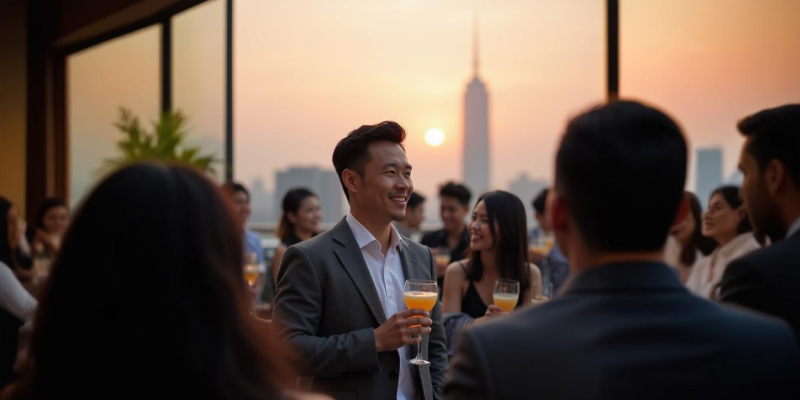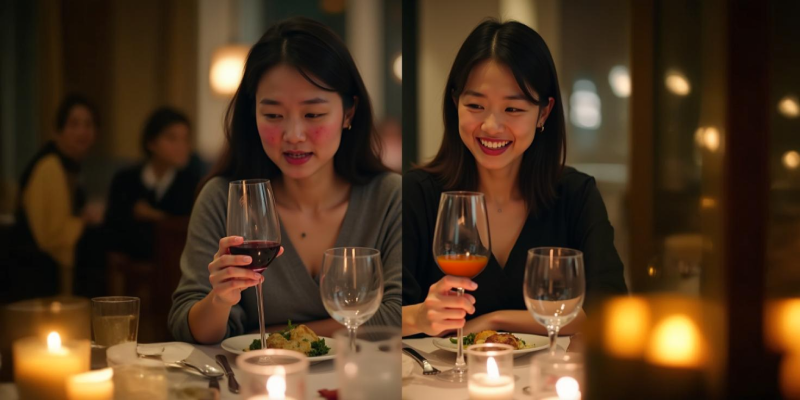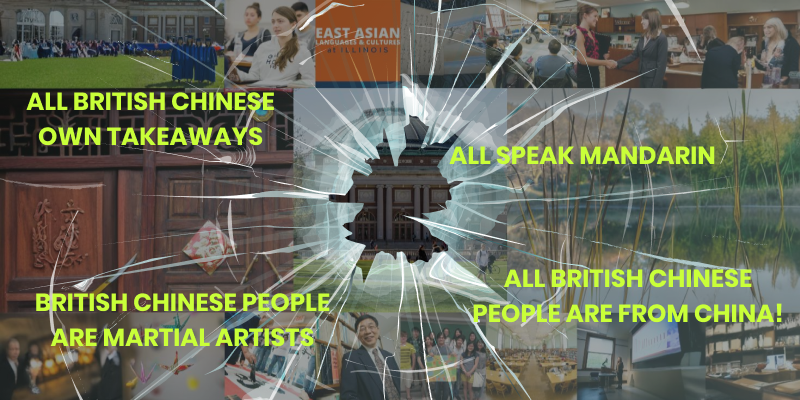
How to Drink Socially Without Worrying About Asian Flush
For many in the East and Southeast Asian community, social drinking can be a challenge due to Asian flush syndrome. This condition, affecting around 30-40% of East Asians, causes face redness, dizziness, nausea, and a higher heart rate after drinking alcohol. It happens because of a genetic defect in the ALDH2 enzyme, which slows down the breakdown of acetaldehyde, a toxic byproduct of alcohol. If you experience Asian flush, you don’t have to avoid social gatherings totally. By making smart choices and following simple strategies, you can still enjoy nights out without discomfort. Here’s how you can drink socially while handling Asian flush. Know Your Limits and Drink Responsibly The easiest way to manage Asian flush symptoms is by reducing your alcohol intake. If you decide to drink, follow these easy strategies: Sip slowly to give your body more time to process alcohol and limit reactions. Set a daily drink limit to avoid excessive buildup of acetaldehyde, the toxin responsible for flushing. Stay hydrated by drinking water between alcoholic drinks, which helps reduce alcohol and slow absorption. Opt for weak drinks like spritzers or cocktails with plenty of ice to lessen the effect. Choose Alcohol Wisely Not all alcoholic drinks cause Asian flush in the same way. Some contain higher amounts of acetaldehyde, histamines, and sulfites, which can worsen symptoms. To reduce discomfort: Avoid beer and red wine as they have high histamine content, which can worsen burning. Choose clear drinks like vodka or gin, which may cause fewer side effects than darker liquors. Dilute your drinks with soda or juice to slow alcohol uptake and lessen the effect on your system. Eat Before You Drink Drinking on an empty stomach can raise Asian flush symptoms, as alcohol is taken more quickly into your bloodstream. To reduce the effects, eat a good meal before drinking. Carbohydrate-rich foods like rice, noodles, and bread help slow alcohol absorption. Protein sources such as tofu, cooked meats, and eggs balance blood sugar and reduce alcohol’s effect. Healthy fats from fruits, nuts, or oily fish form a protected layer in the gut, lowering soreness and stopping alcohol’s effects. Explore Non-Alcoholic Alternatives A terrific time may be had without alcohol. Alcohol-free spirits, mocktails, and non-alcoholic beers are increasingly widely available in bars and restaurants, allowing you to socialise without worrying about Asian flush. Ask the bartender to make a custom mocktail with fresh fruits and herbs for a delicious alternative. Try infused drinks like kombucha, which provide additional health advantages and a refreshing, alcohol-free option. Go to bars that don't serve alcohol or establishments that specialise in unique zero-proof drinks to enjoy a drink without the negative side effects of alcohol. Plan Social Gatherings Around Activities, Not Alcohol Instead of meeting at a bar, plan fun, social events where drinking isn’t the goal. Here are some great alternatives: Karaoke nights, a favourite among the British Chinese community and K-pop fans, where you can sing your heart out without needing alcohol. Food crawls at Asian night markets, are great for exploring real street food and finding new flavours with friends. Outdoor activities like picnics, riding, or hikes, allow you to enjoy fresh air, great company, and lively talks in a relaxed setting. Educate Your Friends About Asian Flush Asian flush is a terrible condition that many people are not aware of. A brief explanation will help you avoid unpleasant situations if you are under pressure to drink. Inform your friends that alcohol affects your body in a different way, leading to symptoms like flushing, dizziness, and nausea. You may foster a more compassionate and encouraging social atmosphere by teaching them. Once they are aware of the tangible effects of your decision, most people will respect it. Connect with the Asian Community on Maccha Socialising isn’t just about drinking—it’s about important relationships. That’s where Maccha comes in. Maccha is the ideal British Chinese community app created for East and Southeast Asians in London to meet like-minded friends, discover interesting events, and stay linked with their culture. Whether you're looking for alcohol-free social events, cultural gatherings, or foodie meetups, Maccha is your go-to platform. With Maccha, you can: Find social gatherings that are not focused on drinking that are inspired by Asian culture. Make connections with people who share your lifestyle by joining interest-based organisations. Whether it's karaoke, street food explorations, or café hopping, plan gatherings for an enjoyable night out. Your social life shouldn't be defined by your drinking. Join Maccha to discover new experiences and enjoy socialising on your terms. Wrapping Up Managing Asian flush doesn’t mean missing out on social experiences. You can enjoy nights out without discomfort by making smart choices, going for low-risk drinks, and exploring alcohol-free alternatives. Surround yourself with friends who accept your choices, and remember that gathering is about more than just alcohol. With the right method, you can drink socially without worry—or better yet, rethink what a great night out looks like.

Asian Flush: How to Manage Alcohol Intolerance in Social Settings
Social drinking is a regular part of many gatherings, but for 30-40% of East Asians, it comes with an unwanted side effect—Asian flush syndrome. This reaction, also known as Asian glow, happens due to a genetic inability to properly break down alcohol, leading to redness, nausea, dizziness, and a higher heart rate. While it may seem like a minor hassle, it can also pose long-term health risks, making it essential to control alcohol consumption carefully. If you or someone you know experiences Asian flush, here are helpful ways to handle social situations without discomfort. Understanding Asian Flush Syndrome Asian flush is caused by a defect in the ALDH2 enzyme, which breaks down acetaldehyde, a toxic byproduct of alcohol. When the body fails to handle this toxin efficiently, it accumulates in the bloodstream, leading to flushed skin, nausea, and other unpleasant symptoms. Aside from the immediate reactions, continued contact to acetaldehyde increases the risk of high blood pressure, esophageal cancer, and other health issues. While some may try to ignore the symptoms, the best way is to manage alcohol intake wisely. How to Manage Alcohol Intolerance in Social Situations 1. Limit Your Alcohol Intake The easiest way to prevent Asian flush is to reduce alcohol consumption or avoid it totally. Many people manage symptoms by drinking slowly, mixing alcohol with water, or setting a tight limit. Pacing yourself helps reduce discomfort while still allowing you to enjoy social gatherings without the unwanted side effects of alcohol intolerance. 2. Choose Non-Alcoholic Alternatives You don’t need alcohol to enjoy a night out. Many bars and restaurants now serve non-alcoholic beers, mocktails, and alcohol-free spirits, giving the same social experience without the negative effects. If you want something in hand, ask the bartender for a custom mocktail, or try a refreshing kombucha or fruit-infused soda. These alternatives let you socialize confidently while escaping the discomfort of alcohol intolerance. 3. Pick Social Activities That Aren’t Focused on Drinking Not all social gatherings need to focus on alcohol. Instead of meeting at a bar, suggest events like: Karaoke Nights: A favorite in many Asian communities, karaoke offers a lively and social environment without the need for alcohol. Food Crawls at Asian Night Markets: Explore different cuisines while going from one food stall to another. Cultural Events & Exhibitions: Attend performances, art showcases, or traditional festivals to celebrate heritage and creativity. Outdoor Activities: Opt for group-friendly choices like riding, camping, or nature walks. Picnics in the Park: Gather friends for a relaxed day with fresh food, games, and good conversation. Game Nights & Escape Rooms: Engage in fun tasks and games that entertain everyone. Wellness & Fitness Meetups: Join yoga lessons, dance classes, or meditation groups for a social yet refreshing experience. By picking parties where drinking isn’t the main focus, you avoid the pressure to drink while still enjoying the company of friends. 4. Eat Before Drinking Eating before drinking can help manage Asian flush symptoms. Consuming carbohydrate-rich or high-protein foods, such as rice, noodles, or lean meats, slows alcohol intake and reduces side effects. Avoid drinking on an empty stomach to reduce the strength of flushing, dizziness, and nausea, ensuring a more relaxed and controlled drinking experience. 5. Know Your Triggers Asian flush symptoms may be triggered to differing degrees by different alcoholic drinks. Because wine and beer have greater levels of sulfite and histamine, they often produce larger reactions. Because they contain less acetaldehyde, clear alcohol like vodka or gin may cause less symptoms when used in moderation. Selecting the appropriate beverage might aid with discomfort management. 6. Stay Hydrated Alcohol dehydrates the body, which can increase Asian flush symptoms like redness, dizziness, and nausea. To reduce these effects, drink plenty of water between alcoholic beverages. Staying wet helps slow down alcohol intake, improves liver function, and allows your body to handle alcohol more efficiently. A good rule of thumb is to swap each alcoholic drink with a glass of water. This simple habit can significantly reduce discomfort and keep you feeling more in control. 7. Educate Your Friends If you often have to explain why you're not drinking, teaching your friends about Asian flush can make social situations easier. Many people are unaware of how serious the condition can be, from uncomfortable redness to nausea and higher health risks. A simple, confident answer can help avoid unnecessary pressure and awkward talks, making it easier to enjoy your night without feeling the need to explain your choices. Stay Social with Maccha: The Ultimate App for the ESEA Community Maccha is the ideal app for you if you want enjoyable social experiences without the pressure to drink. Maccha, launched in London for the East and Southeast Asian (ESEA) population, assists you in: Find Events: That Don't Include Alcohol. Locate community-focused activity-based gatherings, food markets, and cultural festivals. Connect with like-minded people: Meet people who choose to socialize without alcohol and who are aware of the difficulties associated with Asian flush. Arrange Group Activities: Maccha makes event planning simple, whether it's an outdoor excursion, karaoke night, or bubble tea hangout. Experience London's thriving social scene on your terms by becoming a member of the Maccha community. Wrapping Up Asian flush syndrome can make social drinking uncomfortable, but it doesn’t have to stop you from having fun. By limiting alcohol, exploring non-alcoholic choices, and picking alternative social activities, you can enjoy nights out without the adverse side effects. And with apps like Maccha, meeting with the Asian community in London has never been easier. Whether you're looking for drink-free parties or new friendships, Maccha ensures you never miss out on the best experiences. Are you looking for social events without alcohol pressure? Download Maccha and start exploring today.

British Chinese Myths Debunked
The British Chinese community has long been subject to outdated stereotypes that shape the way East Asians are viewed in the UK. These misconceptions, often based on ignorance or a lack of representation, do not reflect the real variety and current identity of British Chinese individuals. While some of these myths have been around for generations, it is important to challenge them and show the reality of who we are today. From ideas about personality traits such as being submissive or highly studious to misconceptions about dating habits, height, and athleticism, these myths do not describe us. The British Chinese community is vibrant, confident, and constantly changing. It is time to set the record straight and celebrate British Chinese people's individuality, perseverance, and successes across the UK. Myth: British Chinese People Are Submissive Reality: We Have Strong Western Values and Excellent Survival Skills One of the most frequent and frustrating myths is that British Chinese people are usually quiet or submissive. This belief likely comes from traditional Asian cultural values, where respect, modesty, and peace are stressed. However, the reality is far from this outdated image. Many British Chinese individuals are raised with Eastern and Western values. Growing up in England or anywhere in the UK, we learn to manage different social standards, speak up for ourselves, and hold strong views. Whether in workplaces, social settings, or relationships, British Chinese individuals are as bold and vocal as anyone else. British Chinese community has changed, grown, and made essential accomplishments in various areas, from business to politics and the artistic arts. We are far from submissive—we are flexible, hardworking, and capable of standing our ground. Myth: British Chinese People Are Short Reality: Height Varies, and Many Northern Chinese Are Tall Another common stereotype is that all Chinese people are short. While it is true that some Southern Chinese populations tend to have shorter average heights than Europeans, this does not apply to everyone. People from Northern China have similar average heights to the populations in the UK. Additionally, Chinese heights have increased over generations due to better nutrition and healthcare. British-Chinese who have grown up with a Western diet also tend to be taller than previous generations. Myth: British Chinese Prefer to Date Outside Their Community Reality: there is almost an equal split between inter and intra-ethnic marriages in the community, signalling a diverse set of preferences There is a common belief that British Chinese individuals, particularly women prefer to date outside their cultural background, often based on the exposure of mixed-race couples in Western media. However, numbers tell a different story. Around half of British Chinese women still marry within the community, and the percentage is even higher for men. The truth is that dating tastes among British Chinese individuals vary. Some people prefer dating within their cultural background due to shared values, customs, and family standards, while others are open to relationships with people from different cultures. British Chinese dating habits are just as different as any other group. Whether someone is looking for a partner within the British Chinese community or exploring connections beyond it, it comes down to personal choice—not a traditional rule. If you want to meet British Chinese individuals for dating or friendship, platforms like Maccha, a top East Asian dating app in the UK, make it easier than ever to connect with like-minded people. Myth: British Chinese People Are Not Sporty Reality: We Have Champions in Sports, From Tennis to Triathlon Another old stereotype suggests that British Chinese individuals are not interested in sports. This idea is simply false, and recent years have provided clear evidence to support it. Take Emma Raducanu, the young British Chinese tennis star who won the US Open in 2021 and made history as one of the biggest rising stars in the sport. Or Alex Yee, an Olympic triathlon gold medalist who has mastered endurance sports, and Joe Choong, an Olympic gold medalist in modern pentathlon. These players and many others have broken the stereotype that British Chinese individuals are not competitive in sports. Whether it is tennis, endrance, or cycling, the ESEA community has a growing presence in the UK’s sports scene. How Maccha Helps Challenge These Myths One of the best ways to break down stereotypes is by making spaces where people can connect, share their experiences, and learn from one another. That is where Maccha comes in. As a leading East Asian dating app in England, Maccha was created to help British Chinese individuals find meaningful connections—whether that is through dating, friendship, or community engagement. The app offers a place where ethnic identity is known and celebrated, helping to create better bonds within the British Chinese and ESEA communities. If you have ever felt like stereotypes do not represent who you are, Maccha allows you to meet people who understand your background while accepting modern, Western values. It is more than just an Asian dating app—it is a place to build confidence, make real connections, and challenge outdated myths. Wrapping Up The British Chinese community is diverse, modern, and ever-evolving. These stereotypes no longer reflect the reality of who we are today. Whether it is the assumption that we are submissive, short, uninterested in sports, or always dating outside our community, it is time to move past these outdated ideas. By recognising British Chinese individuals' achievements, preferences, and individuality, we can reshape the narrative and celebrate a more accurate representation. Whether you are looking to meet British Chinese friends, explore an Asian dating app in the UK, or simply better understand the community, remember—there is more to British Chinese culture than the myths suggest. If you are ready to connect with people who share your values and experiences, Maccha is the perfect place to start.